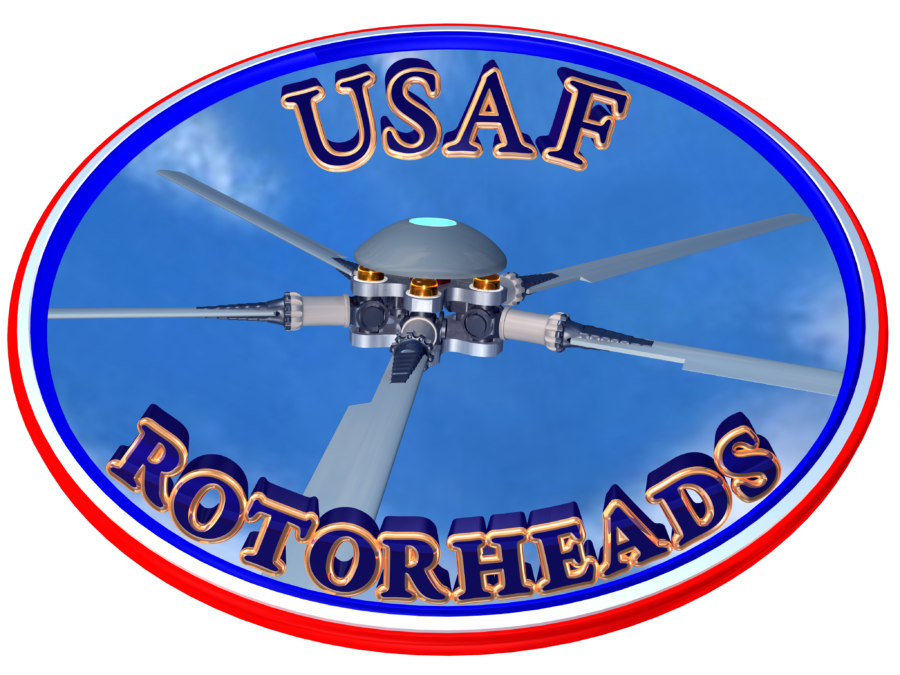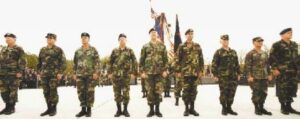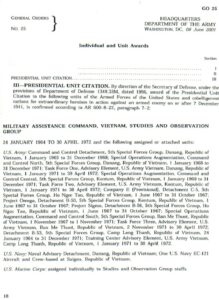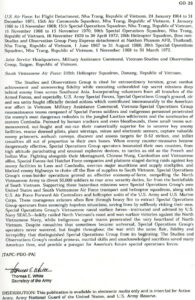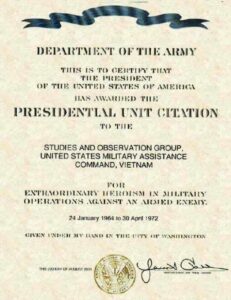Unit Awards
This page contains information on unit awards.
Presidential Unit Citation
20th HS/SOS
Southeast Asia
8 Mar 1966–7 Mar 1967
1 Jun 1967-31 Mar 1972
21 Jun 1968–30 Jun 1969
Military Assistance Command, Vietnam (MACV)
Studies and Observation Group (SOG)
Thursday, April 5, 2001
By Henry Cuningham
Military editor, Fayetteville Online
The Army acknowledged the accomplishments of the most secret commando unit of the Vietnam War on Wednesday.
The Presidential Unit Citation went to the group 29 years after it went out of business and three years after CNN broadcast a bogus report saying it used nerve gas on defectors. The network later retracted its story.
The unit was called the Military Assistance Command-Vietnam Studies and Observation Group, or SOG.
After the ceremony, some of the veterans sarcastically thanked CNN for broadcasting the nerve gas report in 1998.
‘‘I think that (the award) is long overdue, and I think that we have to give some thanks to CNN because the fiasco that they produced caused an investigation by the Department of Defense and others that found that we were not only not war criminals but, in fact, we had a collection of heroes that was not equaled,’’ John K. Singlaub said after the ceremony.
Singlaub, who is 79 years old and a retired major general, lives in Arlington, Va. He was chief of SOG from 1966 to 1968.
The Presidential Unit Citation is given to units that display gallantry that set them apart from other units. The unit award is equal to the individual award of the Distinguished Service Cross, the U.S. military’s second-highest award for valor.
Hundreds of people attended the award ceremony in the plaza on Ardennes Street on Fort Bragg. A statue of SOG veteran Col. Bull Simons stands in the plaza.
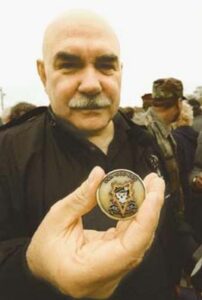
Staff photo by Cindy Burnham
Retired Maj. John L. Plaster holds a coin minted for the SOG ceremony.
Retired Maj. John L. Plaster was the first person to receive a special commemorative coin minted for the occasion. He wrote a book about SOG and worked for recognition of the unit.
‘‘It’s a day that I think most of us thought would never happen,’’ Plaster said after the ceremony. ‘‘Everything we were doing in the old days was denied. We accepted that. That’s part of the cost of doing classified, black operations. Even our existence was denied. There were a great many young men that came home that could never quite tell their families, their friends what they did.’’
Plaster is from Iron River, Wis. He is 52.
SOG members operated deep behind enemy lines in Vietnam, Cambodia and Laos. They conducted operations on the Ho Chi Minh Trail, the North Vietnamese supply line through the countries that border South Vietnam.
SOG members operated deep behind enemy lines in Vietnam, Cambodia and Laos. They conducted operations on the Ho Chi Minh Trail, the North Vietnamese supply line through the countries that border South Vietnam.
The host for the ceremony was Lt. Gen. Doug Brown, commander of U.S. Army Special Operations Command at Fort Bragg.

Staff photo by Cindy Burnham
Lt. Gen. Doug Brown, commanding general, U.S. Army Special Operation Command, stands with South Vietnamese veterans after Wednesday's ceremony.
SOG members had ‘‘the guile and the audacity to take the war where the enemy lives, to get at his sanctuary, to make him react, to take away his safe and secure environment, give him those chills as he is walking down that long jungle trail at night, not knowing if around the corner members of SOG are waiting,’’ Brown said. ‘‘It doesn’t take many. It doesn’t take often, but it takes men of steel, willing to take risks, willing to make the trip.’’
The missions included sabotage, calling in B-52 bomber strikes, search and rescue of downed pilots in the jungle and destruction and recovery of sensitive equipment.
The operations tied down thousands of members of the North Vietnamese Army searching for SOG, Brown said.
At its peak, SOG had about 2,000 members. An estimated 7,800 men served in SOG over its eight-year existence. Some SOG veterans, such as Dick Meadows, Eldon Bargewell and Walt Shumate, became founders and leaders of Delta Force, the Army’s counterterrorism and hostage- rescue unit founded in 1977.
SOG members received more than 2,000 individual awards for heroism, including 10 Medals of Honor, twice as many as the 82nd Airborne Division received in both world wars.
Medal of Honor recipients were Robert L. Howard, James P. Fleming, Roy P. Benavidez, Jon R. Cavaiani, Franklin Miller, Fred Zabitosky, Thomas R. Norris, Loren D. Hagen, John J. Kedenburg and George K. Sisler.
The unit’s members also received 23 Distinguished Service Crosses, the military’s second highest award for valor.
SOG had high casualty rates. In 1968, the unit had more people killed and injured than it had positions.
Ten teams were lost. Fourteen teams were overrun or destroyed. Fifty members of SOG are still considered MIAs.
The highest-ranking SOG veteran on active duty is Lt. Gen. William P. Tangney, deputy commander in chief of U.S. Special Operations Command at Tampa, Fla.
Tangney hailed the members of the Army, Navy and Marines who flew the airplanes and helicopters on the infiltration missions and the fighter airplanes that helped rescue teams.
Retired Maj. John W. Grove, 59, of Fort Walton Beach, Fla., represented Air Force participants.
‘‘Most of our missions were classified for so long that nobody got much recognition,’’ Grove said.
Among veterans at the ceremony were 10 South Vietnamese commandos who were sent on missions to North Vietnam, where they spent 20 years in prison. The Vietnamese, who wore green berets to the ceremony, live in Georgia.
‘‘We are the men who fought the communists,’’ said Son Van Ha, 53.
Active-duty soldiers who received awards during the ceremony were Tangney, Bargewell, Cols. Thomas A. Deluca, Warner Farr, Fredrick D. Jones, Steven J. Yevich, Richard O. Sutton and Dale Brown, Lt. Cols. David Bortnem and Jack L. Kaplan Jr., Chief Warrant Officers 5 Edward G. Klein and Frank Kormorowski and Sgt. John Bartlett.
Soldiers still on active duty but unable to attend were Maj. Gen. Kenneth R. Bowra, Air Force Col. Alva Greenup, Cols. Richard M. Johnson and Doug McCready and Chief Warrant Officers Bob Coder, Gary Ryan, James A. Bates and Hurley J. Gilpin.
Military editor Henry Cuningham
Once-secret Special Operations Unit receives Presidential
By ESTES THOMPSON, Associated Press
FORT BRAGG, N.C. (April 4, 2001 9:19 p.m. EDT http://www.nandotimes.com)
Twenty-nine years after it disbanded, a once-secret Special Operations unit credited with diverting the enemy and rescuing pilots during the Vietnam War received official recognition with a presidential citation Wednesday.
Veterans of the Studies and Observation Group, including some active duty soldiers, were given ribbons and special coins at a ceremony here. A small group of beret-clad Vietnamese stood alongside veterans wearing special black jackets and green berets.
"It's a day that most of us thought would never happen," said John Plaster of Iron River, Wis., a retired Army major. "That's part of the price of doing clandestine operations. Our existence was officially denied."
The unit, made up of Army, Navy and Marine personnel, operated from 1964 until 1972. It had 2,000 U.S. personnel and 8,000 indigenous mercenaries assigned to it at its peak.
Its mission was to divert North Vietnam's army, send back intelligence information, assess bombing sites and results for U.S. planes, and rescue downed U.S. pilots.
Eighteen SOG teams - usually eight men each - disappeared without a trace or were killed in battle. None was returned after the war as prisoners.
About the time that unit files were declassified, it was accused in a 1998 joint CNN-Time story of using sarin gas in Laos during Operation Tailwind, a mission to find defectors. Two U.S. defectors were supposedly killed in the attack, the report said.
The story was retracted when the allegations could not be substantiated. Time and CNN, both owned by Time Warner, apologized for the story.
Plaster said the presidential citation was "the ultimate vindication."
MACV-SOG Presidential Unit Citation Coin
Integrity, Honor, and Respect
Some of the best things cannot be bought, they must be earned
©2023 USAF Rotorheads All Rights Reserved | Financial Statement
